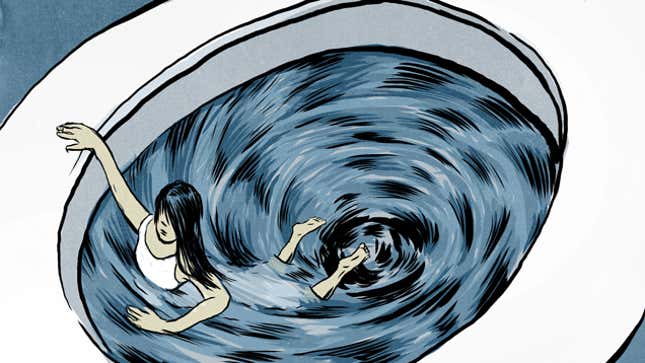Wherein I Learn Bulimia Doesn’t Work, Is More Expensive Than Suspected
Latest

The following is excerpted from Mary H.K. Choi’s new Kindle Single, Oh, Never Mind.
When I was born, I weighed 11 pounds and had a full head of hair. I also bore the tiniest hint of a butt chin, like my dad. My mother’s chin, on the other hand, is smooth and small. Her slight, elegant alleles were no match for my father’s. After all was said and done, her body snapped back to a Size 2 with an alacrity that could testify only to how alien a parasite I’d been. Lugging my enormous swaddled body around with her on buses and trains and to church must’ve looked like a kind of punishment, as though a royal race of fatsos had risen to power and made wet nurses of the bantam class. The primal chemistry that compels one to breastfeed a burden only so it will grow heavier is just one way that babies are scary.
Eleven years later, my mom and I are at the doctor’s office. We are having our worst year yet. We speak in clipped, acid tones, and my brother and father are sick to death of us. I have a bladder infection—my first—and I am mortified. I avoid telling anyone until the pain is intolerable. It’s only after I almost pass out in a bathroom stall at school and miss a quiz because it takes 20 minutes to pee that I have to explain myself. I may strongly dislike my mother, but I will not get a B in French.
I am furious the doctor is a man. Disgraced by the physical inspection, I fume as I undress. I don’t know why my mother lacks the decency to leave the room while I do. My proto-boobs are dense and misshapen. The doctor takes my medical history, and I am forced to inform him that I have had my first period and also my second. I feel my mother’s eyes on me—I never told her—so I stare straight ahead. It’ll be another two years before my friends get theirs. The whole thing feels ungainly and is probably my fault.
When the doctor weighs me, there’s a roaring in my ears. I discover that I am 113 pounds. The number is significant. Ours is not a naked house, but we all know how much our mother weighs. She weighs the same as she did in college, and I am three pounds heavier at a foot shorter. Red crawls up her neck. She stares at me as if her own leg had swollen beyond recognition. I want to die as much as I want to take her down with me.
It’s not my mother’s fault that being around her makes me feel ugly, and that every attempt on my part to look more like her is dark and shameful. My wiring abhors portion control and sensible weight management. I eat until it hurts and then pinch my fleshy midsection until it bruises. It would upset her to know the reasoning behind the wall of radiant anger that stood between us until I moved 2,000 miles away in my twenties. My mother is 63 years old, and her thigh gap is righteous.
-

-

-

-

-

-

-

-

-

-

-

-

-

-

-

-

-

-

-

-

-

-

-

-

-

-

-

-

-

-

-

-

-

-

-

-

-

-

-

-








































